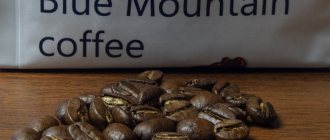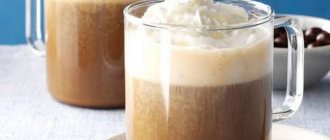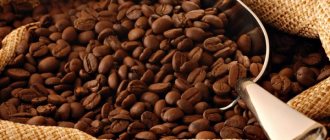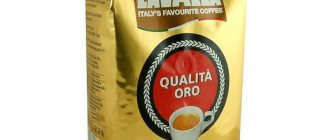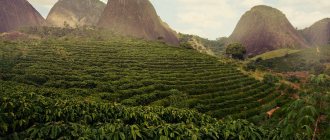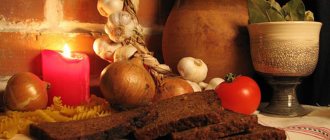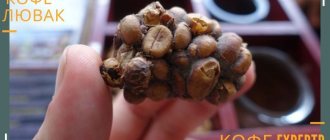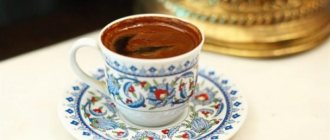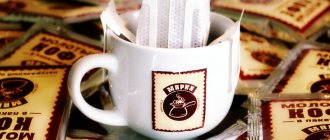Blue Mountain coffee is considered one of the best in the world. It may have only been heard of once, but all coffee drink lovers have heard about it, and true gourmets leave exclusively laudatory reviews. This variety of coffee beans comes from Jamaica and is prepared in this country using special technology. Thanks to its use, it is possible to fully reveal the aromatic and taste properties of this drink.
Jamaica is a great place for coffee
The birth of the coffee industry was accompanied by a very interesting historical event. In the 18th century, King Louis XV of France sent the inhabitants of the colonies a gift from the Dutch - three coffee trees. Only one of them was destined to reach their destination - the island of Martinique. From there, the seedlings migrated to Jamaica. And they took root very well, because in the next century there were more than 600 coffee plantations in this territory.
One of the most famous coffee brands on the planet is Jamaica Blue Mountain. It is great for cooking in a cezve. Fragrant, multifaceted, delicious - these are just some of the epithets that this coffee, produced in sunny Jamaica, is honored with.
Almost half of Jamaica's territory is mountainous. Among them, the highest is Blue Mountain, soaring into the sky at 2256 meters.
This mountain really appears blue due to the fog that shrouds it all year round. Here, on the territory of the Blue Mountains, there are plantations of a unique variety of Arabica.
This was facilitated by the terrain conditions. Jamaica has a favorable climate, fertile soil, and a large number of mountain peaks.
Interesting fact . The main buyer of Jamaican coffee is the Japanese, and they take 4/5 of all products produced.
Features of the region
The Blue Mountains range stretches from Kingston to Port Antonio and reaches 2,256 meters at its highest point.
The region has a warm, humid climate with frequent rain and fog. The soil is fertile and does not lack irrigation. All this creates ideal conditions for the cultivation of excellent coffee.
Blue Mountain Arabica grows in the regions of St. Andrew, St. Thomas, Portland and St. Mary at an altitude of 910 to 1700 meters above sea level.
Coffee from plantations located at an altitude of 460-910 meters is called Jamaica High Mountain, beans grown below 460 meters are classified as Jamaica Supreme or Jamaica Low Mountain.
Premium quality coffee directly from the manufacturer
Jamaica's Coffee Pearl
In the heart of the Caribbean Sea lies the evergreen island of Jamaica, called the “land of springs” by the Arawak Indians. Numerous rivers and streams flow from the mountain slopes, creating waterfalls of incredible beauty.
Jamaica is known for its stunning landscapes. The shores of the island are an endless chain of blue lagoons and snow-white beaches. Local reggae music, made famous by the great Bob Marley and the group UB40, also adds to the popularity of the island. Jamaica is also famous as the birthplace of the world's fastest sprinter, Usain Bolt. And, of course, the real gem of Jamaica is coffee.
The unique landscape and favorable geographical location provided the island with ideal conditions for growing the most famous high-mountain Arabica coffee - Jamaica Blue Mountain. This coffee owes its name to the majestic and beautiful Blue Mountain, the highest point in the Caribbean (2256 meters).
Jamaica Blue Mountain coffee is grown on mountain slopes at an altitude of 1200-2000 meters, surrounded by fruit trees. The abundance of morning fogs, as well as the alternation of rainy and sunny days, allows the coffee berries to ripen slowly, filling the beans with a unique rich taste. This coffee is a true standard of sophistication, recognized by leading experts as the best plantation coffee in the world. Fans of Jamaica Blue Mountain include Ian Fleming and John Lennon.
The uniqueness of Jamaica Blue Mountain coffee is due, in particular, to the peculiarities of its cultivation and exclusively manual picking. The Jamaica Agricultural Commodities Regulatory Authority strictly controls the area where this coffee grows, maintains a register of farmers and plantations, and also carries out regular inspections. As part of the fight against counterfeit products, local manufacturers and foreign importers are licensed.
It is also noteworthy that Jamaica Blue Mountain is the only coffee in the world that is packaged in wooden barrels and supplied on behalf of a government agency, the Jamaica Agricultural Regulatory Authority.
Jamaica Blue Mountain coffee has a rich aroma and chocolate-velvety taste, which fully reveals itself from the first sip.
This coffee is especially valued for its balanced taste, which surprisingly harmoniously combines light sourness, a hint of bitterness and fruity sweetness. The magnificent soft aftertaste of Jamaica Blue Mountain will stay with you for a long time.
Other Jamaican Coffees
The plantations of this blessed country produce good Arabica crops. What other varieties of Jamaican coffee can be found on sale?
- Jamaica High Mountain . These are grains of high mountain origin, but outside the growing range of the famous Blue Mountain. Highland Jamaican coffee is not much inferior to its famous brother. Balanced taste and aroma, soft, devoid of bitterness, taste and a delicate fruity bouquet - these are the distinctive properties of this drink.
- Jamaica Prime . These grains are grown at significantly lower altitudes. But don't think of this coffee as low-grade. It has an expressive aroma and a good, bright taste. Like most Jamaican beans, this coffee is not overly strong, but rather delicate and refined. The brand under which Jamaican highlands beans are sold in the market is called Jamaica Mountain Choice Coffee. This is its official name, approved by the Jamaica Coffee Industry Council.
Jamaican coffee is an expensive variety. 1 kilogram of Blue Mountain will cost approximately 10 thousand rubles and more. When purchasing, pay attention to the quality of roasting, it is crucial.
Heat treatment of grains carried out over high heat can completely “kill” the taste. Due to the reduced density, Jamaican coffee starts out roasted at low heat, which is then increased.
Jamaican coffee enjoys increased attention among connoisseurs of the drink, so it is ideal as a gift for someone who likes to start the day with a cup of aromatic infusion.
Features of preparing Jamaican coffee
Blue Mountain coffee is considered one of the best in the world. It may have only been heard of once, but all coffee drink lovers have heard about it, and true gourmets leave exclusively laudatory reviews. This variety of coffee beans comes from Jamaica and is prepared in this country using special technology. Thanks to its use, it is possible to fully reveal the aromatic and taste properties of this drink.
Blue Mountains in Jamaica
general information
The Blue Mountains are one of the most impressive natural attractions on the island of Jamaica and a major draw for nature lovers.
The region is home to a variety of flora and fauna, including Jamaica's national tree, the towering hibiscus, and the giant Swallowtail, the world's second largest butterfly. The air temperature in the mountains is noticeably lower than at the foot of the mountains at sea level, and the fog that shrouds their peaks gives the mountains a bluish tint. The Blue Mountains of Jamaica were once completely forested. Nowadays, their lower slopes are cleared for agricultural purposes and the gourmet Blue Mountain Coffee, considered one of the best in the world, is grown here. This type of coffee has the longest ripening time and, as a result, an amazing, rich taste. Coffee grows here in the most ideal conditions. The soil on the slope of the former volcano is saturated with phosphorus; cloud layers hanging over Jamaica prevent the scorching rays of the sun from reaching the tender fruits. And regular rains nourish the coffee beans.
There are hundreds of roads in the region, but the most popular is the 7-mile (11.3 kilometer) trail that leads to the highest peak in the Blue Mountains. This is a rather difficult and picturesque route, lasting on average about 7 hours. If you don't have much time, you can use transport - the journey to the peak will take just under an hour. Once there, you can sip a cup of Blue Mountain coffee while taking in breathtaking panoramic views of the island of Jamaica.
Blue Mountains National Park
The main environmental objects in the park are, of course, the mountains themselves. The woodlands within the Blue Mountains region are characterized by unique flora and fauna. In 1997, the World Wildlife Fund, together with the IUCN-World Conservation Union, designated the Blue Mountains Park in Jamaica as a globally important site for the conservation of plant biological diversity.
Of all the flowering plant species found on this island, about 40% are found nowhere else on Earth. There are also many rare and valuable species among orchids, bromeliads, and ferns.
In addition to plants, the national park has many unique birds (28 species). These include local blackbirds and Jamaican blackbirds.
Among other representatives of the unique fauna, one can highlight a huge variety of tree frogs, giant butterflies (for example, the swallowtail butterfly and the giant Swallowtail live here), many on the mountain slopes and various rodents, among them a large marmot.
National park protection
Today, the main problem of the Blue Mountains National Park is considered to be the threat of deforestation, as well as improper use of land and soil management.
Among the rain forest of Jamaica, a mass of rare and very valuable (including expensive) tree species are concentrated. Such trees include cedar, mahogany, maho and other broad-leaved tree species. Therefore, it is not surprising that such an acute problem as deforestation appears.
Basic conservation operations in the Blue Mountains Park include strict security of park boundaries, hiring and training of rangers to maintain order in the park, the establishment of security stations, the availability of radio communications and vehicles and, importantly, the constant monitoring of all plant and animal species in the park.
Description of the variety
Coffee beans in Jamaica are harvested entirely by hand. They are processed using the wet method. In addition, they undergo special sorting. All beans are divided into categories. The highest among them is considered Grade-1. Such beans are only exported.
Jamaica Blue Mountain is considered the best among elite varieties. It is characterized by a balanced combination of sweetness and tartness, as well as a rich aroma. Gourmets appreciate it for its pleasant nutty hue, slightly perceptible sourness and long-lasting fruity aftertaste.
The variety is also considered unique due to the characteristics of growing beans. The plantations are small and located at great heights. Coffee fruits are exported in small quantities. They are placed in oak barrels, on which a stamp is placed confirming their belonging to the famous species. Due to this, it is possible to avoid counterfeits.
Features of Blue Mountain
In Jamaica, all coffee is harvested by hand. Processed exclusively using a wet method. Grain sorting occurs under the supervision of experienced specialists from licensed enterprises. Thanks to this system, grains are divided into different categories, the highest of which is Grade-1. This coffee is intended exclusively for export.
Jamaica Blue Mountain coffee ranks at the pinnacle of the global coffee industry, despite the fact that there are many elite and respected Arabica varieties.
Jamaica Blue Mountain premium coffee is a balanced combination of aroma, consistency, astringency and sweetness. True coffee connoisseurs will truly appreciate the excellent nutty flavor of this Jamaican drink. If you prepare Jamaica Blue Mountain premium correctly, it will not be very sour and will be quite bright. There will also be a slightly sweet taste with a fruity nectar aftertaste.
This coffee becomes unique not only because of its taste, but also due to the peculiarities of growing coffee beans. Blue Mountain coffee is grown in small areas, and premium class coffee is exported in very limited quantities. To eliminate counterfeits, the island has created a list of authorized producers and exporters who sell genuine Blue Mountain coffee. The Chamber also stamps each barrel of coffee with the Jamaica Blue Mountain specialty stamp.
Jamaican coffee recipe
Jamaican coffee has a very extraordinary, multifaceted taste and aroma. It's not at all difficult to prepare. The main thing is to strictly follow the step-by-step instructions.
Ingredients
You will need the following products:
- 3 teaspoons ground Jamaica Blue Mountain coffee;
- 600 ml water;
- 3 teaspoons granulated sugar;
- salt (on the tip of a knife);
- 1 orange;
- half a lemon;
- 40 ml rum;
- 50 g powdered sugar.
Step-by-step instruction
To prepare real Jamaican coffee, you need to follow these steps:
- Pour the crushed grains into the Turk.
- Add salt and sugar to the mixture.
- Mix the resulting mixture thoroughly and place on the stove.
- After warming up the container a little, pour in water.
- Wait until the foam appears and remove the Turk from the stove.
- Stir the rising grounds and put the dish back on the fire.
- After the first bubbles appear, set the cezve aside and cover with a saucer.
- Infuse the drink for five minutes.
- Wash the citrus fruits well and cut into thin slices.
- Place orange and lemon in a saucepan.
- Pour the prepared coffee on top.
- Place the dishes on the stove.
- Immediately after boiling, pour in the rum and add powdered sugar.
- Mix the resulting mass thoroughly.
- Once the powdered sugar has dissolved, remove the pan from the heat.
- Pour the resulting drink into glasses using a strainer.
- Garnish with a slice of lemon.
It is allowed to use whipped cream and all kinds of fruits as decoration.
If desired, you can use coffee balsam or cognac instead of rum. With their help, it will also be possible to give the drink a characteristic alcoholic tint.
Blue Mountain is one of the most expensive beans. Finding it on sale turns out to be problematic. As a rule, blends are presented that contain about 5% of these famous grains.
Naturally, the taste of such a mixture will not be as harmonious as in the case of using a single variety. Therefore, when making a purchase, it is so important to carefully study the composition and make sure that there are no other types of beans in it.
Features of Blaser Blue Mountain coffee production
On the island of Jamaica, exclusive varieties of coffee of the highest quality are grown. Coffee trees grow in soil rich in microelements such as phosphorus, nitrogen, and other minerals. Coffee berries ripen in the highlands for a very long time, up to 11 months.
Coffee fruits are collected using the picking method, after which they are sent for processing. In Jamaica, only the wet coffee processing method is used. Its advantages compared to the dry method can be found in our article “How coffee fruits are processed: methods and technologies.”
Reason for Blue Mountain's popularity
Jamaica is the pearl of the Caribbean. The most precious thing that Jamaica gave to the world is Jamaica Blue Mountain coffee. This drink is recognized as the best masterpiece of the world coffee industry. Of course, there are many good varieties of Arabica in the world, but this Jamaican coffee is unsurpassed in all respects, as it differs in both aroma and taste. This coffee has such an impeccable reputation that every kilogram of green beans is worth its weight in gold.
As for the history of Blue Mountain coffee, it was brought to Jamaica in 1728, and already in the 19th century there were about 600 plantations on the island. Collectively, more than 15 tons of Jamaica Blue Mountain's finest beans are harvested each year. It is also worth knowing that not all Arabica beans grown on the island of Jamaica have Blue Mountain status. Only those grains that are grown on mountain plantations in the eastern part of the island can be called this way. And also the main thing is that such grains grow at an altitude of up to 2200 meters above sea level. This arrangement of plantations allows the grains to steam slowly under a cloudy sky, and the stable temperature helps to ripen for a long time. All growing conditions allow us to obtain grains that are fully ripened, which is why their quality speaks for itself.
Taste and aroma of coffee
Grown in these conditions and gently processed, the coffee is nutty and has the perfect balance of acidity, sweetness and richness. This variety of Arabica is one of the softest due to the lower volume of caffeine in the beans. Jamaica Blue Mountain is delivered to different countries of the world not in bags, like other varieties, but in oak barrels.
There is a special Committee on the island that strictly ensures that only the best coffee beans have the right to be called Jamaica Blue Mountain.
Every person who loves coffee and understands all the shades of its taste should try this wonderful Arabica variety at least once in their life. It will be a real pleasure to buy a copper pot in Pyatigorsk, Jamaica Blue Mountain beans and brew aromatic and delicious Turkish coffee.
Everyone will appreciate the pleasant sweetness of coffee, seasoned with a slight sourness, its nutty aftertaste, and will admire its aroma of fruits and berries interspersed with woody notes.
Fakes
Of course, such demand could not help but provoke a wave of counterfeits.
Some suppliers cheat and include Blue Mountain in blends, but in reality, such blends most often contain only a tiny percentage of the precious grains.
How to distinguish original from fake
- Certification mark. The Jamaica Coffee Board takes great care to ensure that only genuine Blue Mountain is labeled as such.
- Recommendations. There are several trusted suppliers: Blue Mountain Coffee, Coffees of Jamaica, J. Martinez and Company, Precious Provisions, Fresh Roasted Coffee.
How to drink Blue Mountain coffee
This expensive and rare variety is recommended to be ground in small portions immediately before cooking. Whole grains should be kept in a vacuum sealed container in a cool, dark place (not in the refrigerator).
The best way to get the most out of your beans is to brew them in a French press or “drip” filter. It is advisable to take filtered or bottled water.
Due to the weak acidity, espresso lovers should opt for another variety.
Jamaica's mountains join UNESCO World Heritage List
The mountains of the island nation, from the top of which you can see neighboring Cuba, are the first natural attraction of the Caribbean islands to be designated a World Heritage Site. Two mountain ranges have received protected status: the John Crow Mountains and the Blue Mountains of Jamaica.
The impressive mountain landscape of Jamaica joins the ranks of such world-famous places as the Great Wall of China, the Pyramids of Giza in Egypt, the Taj Mahal in India, the Acropolis in Greece, the Great Barrier Reef in Australia, etc. John Crow Mountains and Blue Mountains (BlueMountains) in Jamaica are classified as “mixed natural and cultural sites”.
In 2011, the authorities of the island state already proposed to the UNESCO committee to include the mountain ranges in the World Heritage List, but then preference was given to other candidates. It was decided to approve Jamaica's application only now, at the next meeting of the committee, which takes place in Bonn, Germany from June 28 to July 8.
|
The Blue and John Crow Mountains are located in southeastern Jamaica and are a densely forested mountain destination rugged with trails. The highest point, Blue Mountain Peak (2,256 meters above sea level), offers views of the entire island and neighboring Cuba. The lower slopes of the mountains are suitable for growing one of the most expensive coffee varieties in the world - Jamaican blue coffee. Here, in the hard-to-reach forests, in the 17th century, the Maroons, African residents hiding from European colonialists, and representatives of the indigenous Taino Indian tribe found refuge. The Maroons were able to evade persecution thanks to an extensive network of trails and shelters that formed the so-called “heritage route” of the city of Nanny Town.
Descendants of fugitive slaves still live in the country's mountain ranges. The close spiritual ties of the Maroons with forests and mountains are evidenced by religious rituals, dances and medicine. The music of the descendants of fugitive slaves has already received UNESCO recognition as an object of intangible cultural heritage.
In addition, the natural monument stands out among other attractions of the Caribbean islands with its wealth of rare species of flora and fauna. The area contains many endangered species of lichens, mosses and flowers. One of the symbols of the country, the evergreen hibiscus, reaching 25 meters in height, also grows here, and the second largest butterfly in the world, the swallowtail, also lives.
Federal magazine "Highlander".
For those who love heights
Category: News from the mountains -> Around the world
Tags: Travel and tourism | mountains | UNESCO | World Heritage | John Crow Mountains | Blue Mountains | Jamaica, Worldwide
Leave a comment!
To leave a comment, register
or
log in
through your account.
